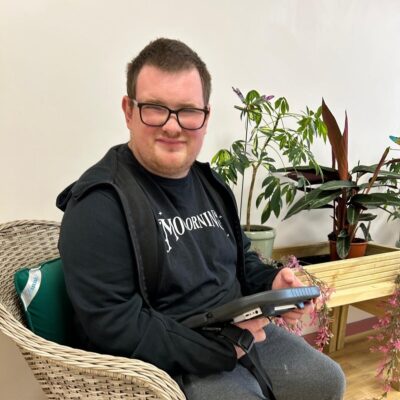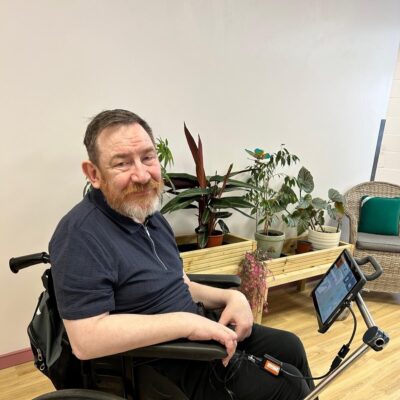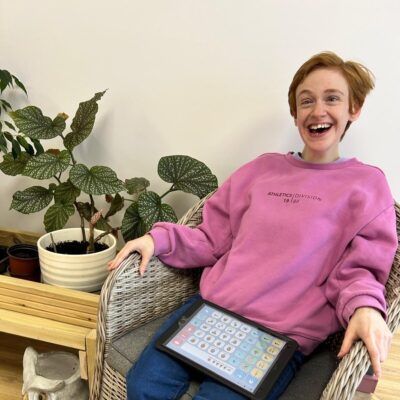My voice, My choice: Person-centred support at ECL Basildon
At ECL Basildon, a day centre for adults with learning disabilities and/or autism, three customers—William, Stephen, and Louise—have recently taken a big step forward in how they connect with the world around them. Each of them has cerebral palsy and a learning disability, and until recently, all three faced daily challenges with making themselves understood.
Part of ECL’s person-centred approach to care is looking at the barriers customers face and finding ways to overcome them. The ECL team collaborated with William, Stephen and Louise, their families and key third parties to find a solution to these communication hurdles. The outcome was the introduction of Augmented and Alternative Communication (AAC) devices. Thanks to this transformative technology, they now have a much stronger voice.
William, a huge Disney fan, has always been enthusiastic about sharing his passions. He can speak, but due to his cerebral palsy, his words are often hard to understand unless you're very familiar with him. That meant when new support staff came on board, it was frustrating and isolating for him.

This sometimes led to behaviour that raised concerns. David Hitchin, ECL’s Positive Behaviour Support Advisor at ECL recognised that his frustration came from not being able to get his point across and referred William to the ECL Speech and Language Therapy (SALT) team.
Stephen and Louise were in a similar boat. Stephen is bright, sociable, and has a great sense of humour, but his speech is difficult to understand due to his cerebral palsy. Louise is limited to yes/no verbal communication and uses some Makaton, but her personal signing style often made it tricky for others to follow. All three individuals wanted to communicate more clearly and more frequently. The staff at ECL could see their potential, so they referred the three customers to ECL’s clinical team, led by Jennifer Whitaker, a SALT professional.
Jenny recognised that while they each had the cognitive ability to form sentences, they needed a better and more accessible way to express themselves. She felt an AAC device would be the perfect fit. William already had a speech app on his phone, but it was hard to use on a small device and was often overlooked because people around him knew him so well. He needed a solution that would work in all situations and with new people.
Jennifer referred the group to the Communication Aid Service East of England (CASEE), a specialist AAC service that supports people with complex communication needs across the East of England. The CASEE team, made up of speech therapists, occupational therapists, and technicians, carried out in-depth assessments with each customer.
Taking a truly holistic approach, they worked with the individuals, their families, the ECL Clinical Team, and the staff at ECL Basildon to establish each person’s needs. A Talk Mat, a visual aid used in Speech and Language Therapy was used to help each person express their hopes and goals for communication, whether chatting with friends, expressing needs, or sharing feelings.
As a result, each of the three customers received their own personalised AAC device. The CASEE Occupational Therapist identified that Stephen had difficulty with touchscreens and was given a device with a Switch, which can be operated by almost any body part that is able to produce consistent and voluntary movement, and an adapted arm mount. William received a larger, more accessible iPad with a custom shoulder bag, making it easier to use on the go, even alongside his walking aid. Louise now has a voice that cuts through the barriers her unique Makaton signs once created.
Introducing the devices was a team effort. ECL support workers and family members attended CASEE training to learn how to support the use of the devices in everyday life. It went beyond learning how the technology works and encompassed how to embed it into everyday routines, including ensuring devices are charged, that vocabulary is relevant and up-to-date, and that everyone is encouraged to use them in genuine interactions. The ECL SALT team continues to support customers and staff, ensuring devices stay suited to each person’s needs, interests, and goals.
The impact has been powerful.
Stephen, who recently lost his mum, is now able to communicate clearly with professionals about his future care and connect with others at the day centre in a meaningful way.
He says, “The best thing about my device is that it enables me to tell jokes, take photos, and express my feelings to my Support Workers more clearly.” True to form, during a quiet moment at the centre, he used his device to ask, “Is something wrong?”—before bursting out laughing, a perfect example of his cheeky humour shining through.

William has gone from feeling frustrated to empowered because he can make himself heard and understood. He uses his device to socialise more confidently and loves ordering food in restaurants, including on a recent Disney cruise. He shares, “Before I had my device, I felt frustrated because I couldn’t get my point across. Now I can interact more with a wider range of people and feel more confident in group settings.”
Louise is thrilled to be able to participate in conversations at the centre, and her face lights up when using her device. She’s also having more meaningful interactions at home, particularly with her brother Jack, who also attended the training.
Before having the device, my peers didn’t acknowledge me because they didn’t understand my Makaton. Now I can use the tablet – it gives me a voice to call their names and speak to friends and staff at the day centre.
Most importantly, Louise used her device to add, “Thank you for asking. It’s been good that I’ve been involved in this project!” This is a reminder that this process hasn’t just been about giving people technology. It’s been about giving them a say, a choice, and a voice.

Through true collaboration, creativity, and a commitment to person-centred care, the team at ECL Basildon, in partnership with CASEE, has opened the door to connection, confidence, and independence for William, Stephen, and Louise.